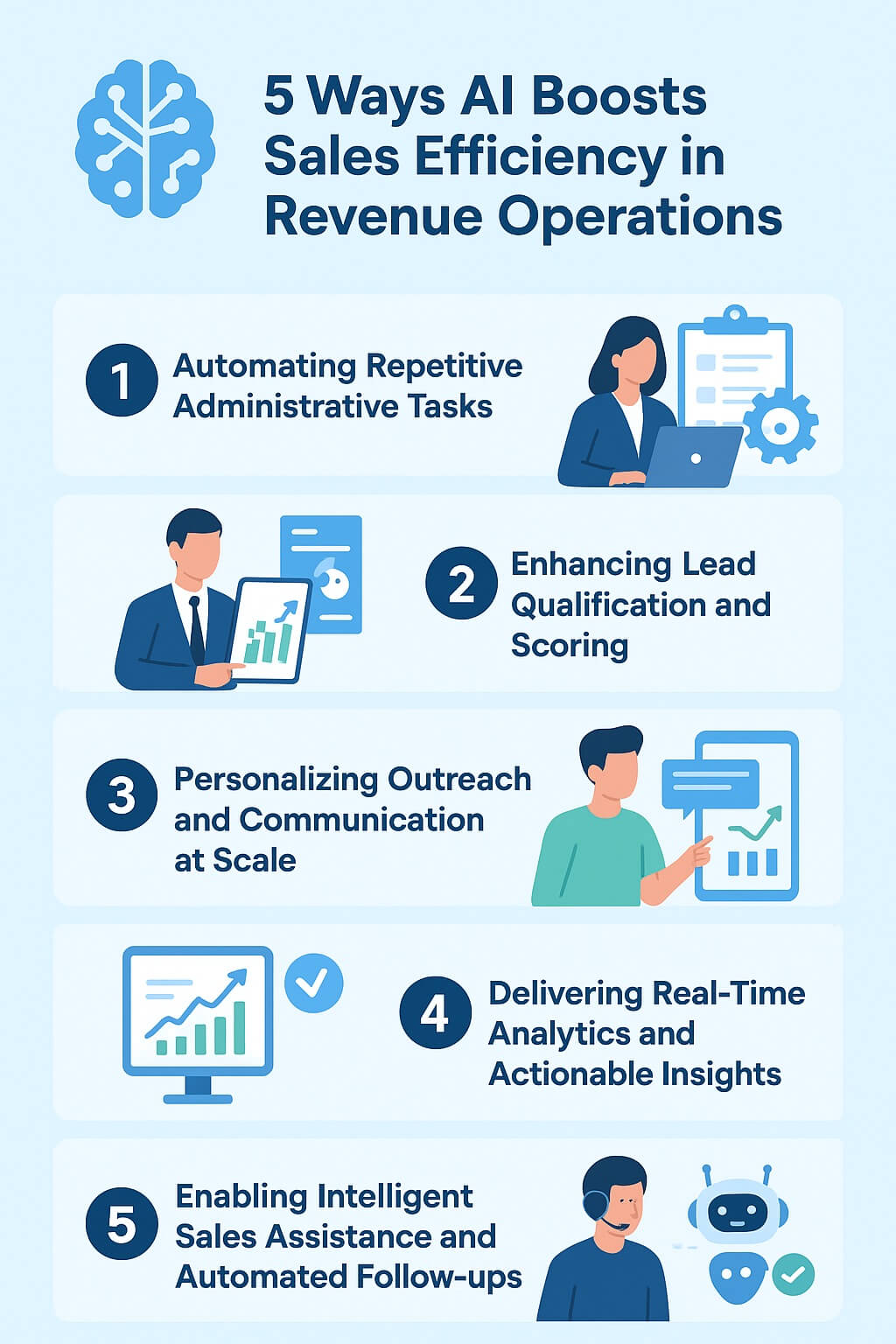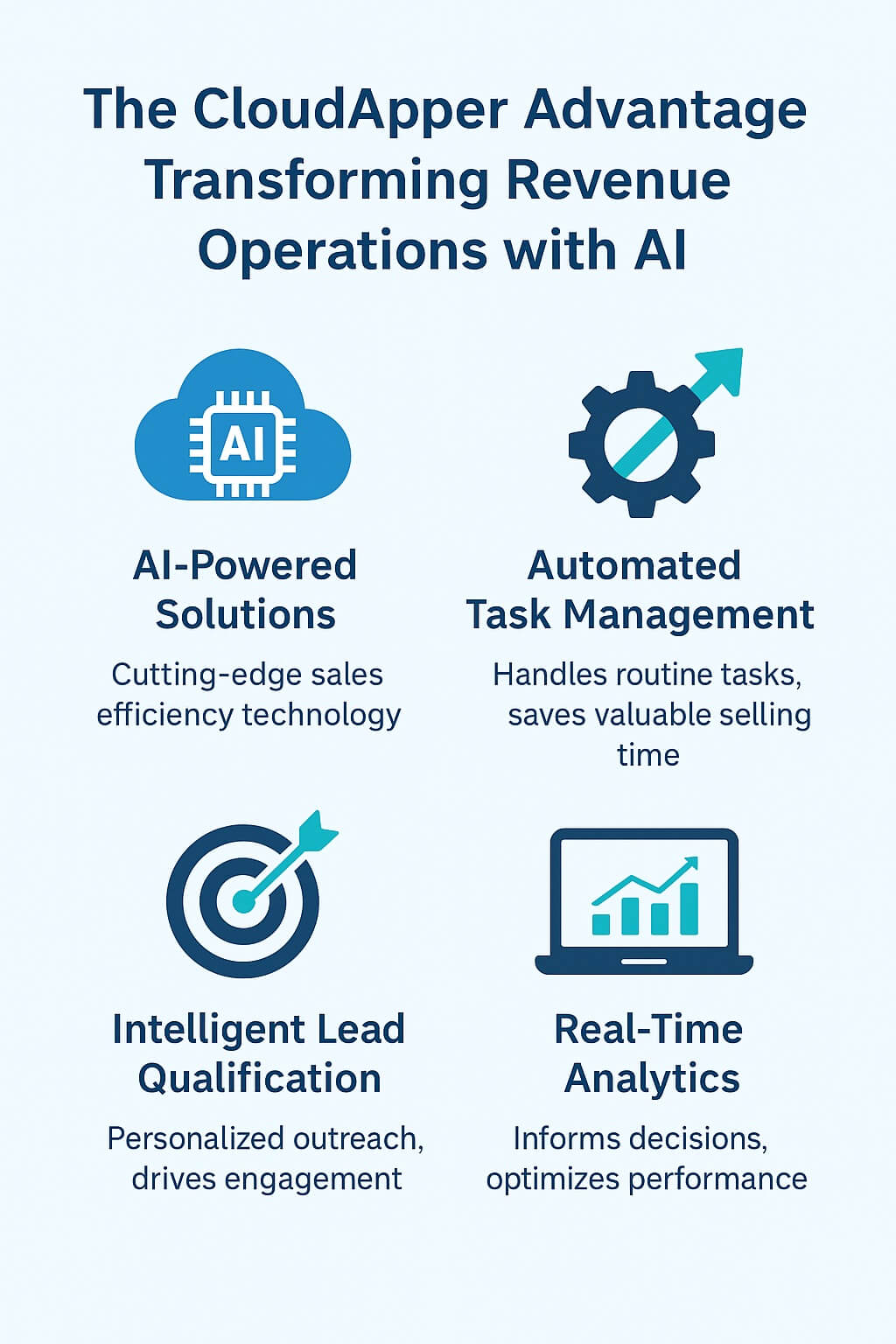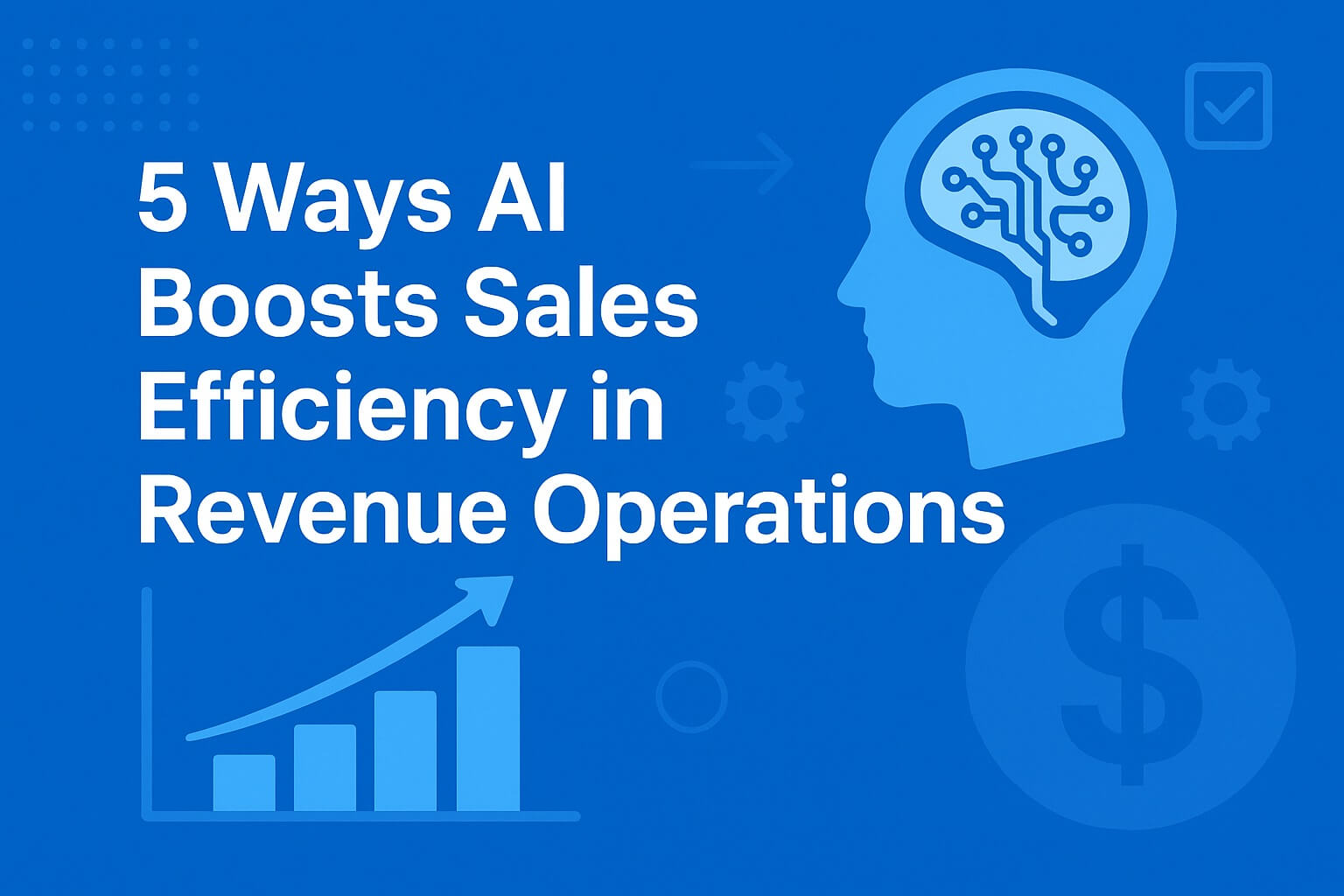Revenue operations teams are under tremendous pressure to produce results more quickly, intelligently, and efficiently than ever before in the fiercely competitive business environment of today. Even though they are fundamental, traditional sales procedures frequently fail to satisfy the needs of contemporary consumers who demand individualized attention and prompt responses. The way revenue operations teams approach sales efficiency is being revolutionized by artificial intelligence.
The integration of AI in sales isn’t just a trend; it’s become a critical competitive advantage that separates high-performing revenue organizations from those struggling to keep pace. Companies leveraging AI in their sales processes report up to 50% increases in qualified leads and 37% improvements in revenue growth. But what exactly makes AI so powerful in the context of revenue operations, and how can sales teams harness this technology to boost their efficiency?
Understanding Revenue Operations (RevOps) and the Efficiency Imperative
Revenue Operations, commonly known as RevOps, represents a strategic approach that aligns sales, marketing, and customer success teams around a unified revenue growth strategy. Unlike traditional siloed departments, RevOps creates a cohesive system where all revenue-generating activities are orchestrated to maximize efficiency and eliminate friction in the customer journey.
The modern RevOps framework encompasses several critical functions: lead management and qualification, sales process optimization, customer relationship management, performance analytics, and revenue forecasting. Each of these areas presents unique challenges that, when multiplied across an entire organization, can significantly impact overall sales efficiency.
Efficiency in RevOps isn’t just about working faster—it’s about working smarter. Sales teams today face an avalanche of data, countless administrative tasks, and increasingly sophisticated buyers who demand personalized interactions at every touchpoint. The manual processes that once defined sales operations are no longer sustainable in an environment where speed, accuracy, and personalization determine success.
This is where AI becomes indispensable. By automating routine tasks, providing intelligent insights, and enabling data-driven decision-making, AI allows RevOps teams to focus their energy on high-value activities that directly drive revenue growth. The result is a more efficient, effective, and scalable sales operation that can adapt to changing market conditions and customer expectations.

1. Automating Repetitive Administrative Tasks
One of the most immediate and impactful ways AI boosts sales efficiency is through the automation of repetitive administrative tasks that traditionally consume hours of valuable selling time. Sales representatives spend an average of 21% of their day on administrative activities—time that could be better invested in building relationships and closing deals.
AI-powered automation transforms mundane tasks into seamless background processes. Data entry, which once required manual input of lead information, contact details, and interaction notes, can now be automatically captured and organized. AI systems can extract relevant information from emails, calls, and meetings, then populate CRM systems with accurate, structured data without human intervention.
Calendar management represents another area where AI automation delivers significant efficiency gains. Intelligent scheduling systems can coordinate meeting times across multiple participants, automatically send reminders, and even reschedule appointments based on changing priorities or conflicts. This eliminates the back-and-forth communication that typically accompanies meeting coordination.
CloudApper AI Sales Agent exemplifies this automation capability by handling routine sales tasks that traditionally bog down revenue teams. The platform can automatically qualify leads, update CRM records, schedule follow-up activities, and generate progress reports. This allows sales representatives to focus their attention on strategic activities like relationship building and deal negotiation rather than getting lost in administrative minutiae.
Follow-up communication, often the difference between a closed deal and a missed opportunity, becomes more consistent and timely with AI automation. Instead of relying on individual sales reps to remember and execute follow-up sequences, AI systems can automatically send personalized messages at optimal times based on prospect behavior and engagement patterns.
2. Enhancing Lead Qualification and Scoring
Traditional lead qualification processes often rely on basic demographic information and manual assessment, leading to inconsistent scoring and misallocated resources. AI revolutionizes lead qualification by analyzing vast amounts of data points to identify the prospects most likely to convert, enabling sales teams to prioritize their efforts more effectively.
AI-powered lead scoring systems evaluate multiple variables simultaneously: demographic information, behavioral data, engagement history, website interactions, content consumption patterns, and social media activity. Machine learning algorithms continuously refine these scoring models based on historical conversion data, ensuring that qualification criteria evolve with changing market conditions and customer preferences.
Behavioral analysis represents a particularly powerful aspect of AI-driven lead qualification. By tracking how prospects interact with marketing content, respond to communications, and navigate through the sales funnel, AI systems can identify subtle patterns that indicate purchase intent. A prospect who downloads multiple whitepapers, attends webinars, and visits pricing pages multiple times receives a higher qualification score than someone who only engages superficially with marketing materials.
Predictive analytics takes lead qualification even further by forecasting the likelihood of conversion and the potential deal value. These insights enable sales teams to allocate their time and resources to the prospects with the highest probability of becoming valuable customers. Instead of pursuing every lead equally, sales representatives can focus their energy on opportunities that offer the greatest return on investment.
Real-time qualification updates ensure that sales teams always have the most current information about prospect engagement. As prospects interact with various touchpoints—opening emails, clicking links, downloading content, or visiting key website pages—their qualification scores adjust automatically. This dynamic scoring enables sales teams to strike while the iron is hot, reaching out to prospects at precisely the moment their interest peaks.
3. Personalizing Outreach and Communication at Scale
Modern buyers expect personalized experiences that demonstrate a deep understanding of their specific needs, challenges, and goals. However, delivering truly personalized communication at scale has historically been one of the greatest challenges in revenue operations. AI bridges this gap by enabling hyper-personalized outreach that feels individually crafted while being efficiently automated.
AI-powered personalization goes far beyond simply inserting a prospect’s name into an email template. Advanced systems analyze prospect data, company information, industry trends, and behavioral patterns to craft messages that resonate with specific pain points and interests. This might include referencing recent company news, addressing industry-specific challenges, or highlighting relevant case studies and success stories.
Dynamic content generation allows sales teams to create multiple variations of outreach messages that automatically adjust based on prospect characteristics. An AI system might generate different email versions for C-level executives versus middle management, adjusting the tone, messaging focus, and call-to-action to align with each audience’s priorities and decision-making authority.
CloudApper AI Outreach Agent demonstrates the power of intelligent personalization by automating the creation and delivery of customized communication sequences. The platform analyzes prospect data to determine optimal messaging strategies, timing, and channels for each individual lead. This ensures that every prospect receives communications that feel personally relevant while maintaining the efficiency of automated delivery.
Channel optimization represents another dimension of AI-powered personalization. Different prospects prefer different communication channels—some respond better to email, others to phone calls, and still others to social media engagement. AI systems can analyze past interaction data to determine each prospect’s preferred communication methods and timing, ensuring that outreach efforts reach prospects through their most receptive channels.
The result is a significant improvement in response rates and engagement quality. Sales teams using AI-powered personalization typically see 20-30% increases in email open rates and 15-25% improvements in response rates compared to traditional mass outreach approaches.
4. Delivering Real-Time Analytics and Actionable Insights
Data-driven decision-making has become essential for revenue operations success, but the sheer volume of available data can overwhelm even the most analytical sales teams. AI transforms raw data into actionable insights that guide strategic decisions and tactical adjustments throughout the sales process.
Pipeline analytics powered by AI provide unprecedented visibility into sales performance and forecasting accuracy. Instead of relying on static reports that quickly become outdated, AI systems continuously analyze pipeline data to identify trends, bottlenecks, and opportunities. Sales managers can see in real-time which deals are progressing smoothly, which are stalling, and which require immediate intervention.
Predictive analytics capabilities enable revenue teams to forecast outcomes with greater accuracy and confidence. By analyzing historical deal data, current pipeline metrics, and external market factors, AI systems can predict quarterly and annual revenue performance with remarkable precision. This forecasting capability allows organizations to make informed decisions about resource allocation, hiring plans, and strategic initiatives.
Performance optimization insights help individual sales representatives and entire teams improve their effectiveness. AI systems can identify which sales activities correlate most strongly with closed deals, which messaging approaches generate the best responses, and which prospects are most likely to convert within specific timeframes. These insights enable continuous improvement and strategic refinement of sales processes.
Competitive intelligence powered by AI provides valuable context for sales strategies and positioning. By analyzing market data, competitor activities, and customer feedback, AI systems can identify emerging opportunities and potential threats. This intelligence enables sales teams to adjust their approaches proactively rather than reactively responding to market changes.
Real-time dashboard capabilities ensure that all stakeholders have access to current performance metrics and insights. Whether it’s daily activity tracking, weekly pipeline reviews, or monthly performance assessments, AI-powered analytics platforms provide the transparency and accountability necessary for high-performing revenue operations.
5. Enabling Intelligent Sales Assistance and Automated Follow-ups
The most sophisticated AI applications in revenue operations involve intelligent sales assistance that acts as a virtual team member, providing support, guidance, and automation throughout the sales process. This technology represents a significant evolution from basic automation tools to truly intelligent systems that can adapt and respond to complex sales scenarios.
Intelligent conversation analysis helps sales representatives improve their effectiveness by providing real-time feedback and suggestions during prospect interactions. AI systems can analyze call recordings, email exchanges, and meeting notes to identify opportunities for improvement, suggest optimal responses, and highlight important information that might otherwise be overlooked.
Automated follow-up sequences powered by AI ensure that no prospect falls through the cracks while maintaining the personalized touch that drives engagement. These systems can determine optimal follow-up timing, craft appropriate messages based on prospect behavior and stage in the sales cycle, and automatically schedule subsequent touchpoints. The intelligence behind these systems enables them to adapt follow-up strategies based on prospect responses and engagement levels.
Sales coaching and guidance represent emerging applications of AI that support individual performance improvement. AI systems can analyze successful sales calls, identify best practices, and provide personalized coaching recommendations to help representatives refine their approach. This technology democratizes access to sales expertise and accelerates the development of junior team members.
CloudApper AI Sales Agent and CloudApper AI Outreach Agent work in tandem to provide comprehensive intelligent sales assistance. The Sales Agent handles routine tasks like lead qualification, data entry, and progress tracking, while the Outreach Agent manages personalized communication sequences and follow-up campaigns. Together, these tools create a powerful AI-driven sales ecosystem that enhances every aspect of the revenue operations process.
Intelligent routing and assignment capabilities ensure that leads are automatically directed to the most appropriate sales representatives based on territory, expertise, availability, and past performance. This optimization reduces response times and improves the likelihood of successful conversions by matching prospects with the best-suited sales professionals.
The CloudApper Advantage: Transforming Revenue Operations with AI
CloudApper’s AI-powered solutions represent the cutting edge of sales efficiency technology, offering revenue operations teams the tools they need to compete and win in today’s demanding marketplace. The CloudApper AI Sales Agent serves as a comprehensive automation platform that handles the routine tasks that traditionally consume valuable selling time, while the CloudApper AI Outreach Agent ensures that every prospect receives personalized, timely communication that drives engagement and conversion.

These platforms integrate seamlessly with existing CRM systems and sales tools, ensuring that teams can adopt AI capabilities without disrupting established workflows. The user-friendly interfaces and intuitive design make it easy for sales teams to leverage advanced AI capabilities without requiring extensive technical training or support.
The combination of automated task management, intelligent lead qualification, personalized outreach, and real-time analytics creates a powerful synergy that amplifies the effectiveness of every team member. Sales representatives can focus on what they do best—building relationships and closing deals—while AI handles the operational details that support these high-value activities.
Implementation Strategies for AI-Driven Sales Efficiency
Successfully implementing AI in revenue operations requires a strategic approach that considers both technological capabilities and organizational readiness. The most effective implementations begin with clear objectives and realistic expectations about AI’s role in the sales process.
Start by identifying the specific pain points and inefficiencies in your current revenue operations. Whether it’s lead qualification bottlenecks, inconsistent follow-up processes, or inadequate performance visibility, understanding your challenges will guide the selection and configuration of appropriate AI solutions.
Training and change management play crucial roles in successful AI adoption. Sales teams need to understand how AI tools enhance rather than replace their expertise. Emphasize that AI handles routine tasks so that sales professionals can focus on the strategic, relationship-building activities that require human insight and creativity.
Data quality and integration represent foundational requirements for effective AI implementation. Ensure that your CRM systems, marketing automation platforms, and other sales tools are properly configured and contain accurate, up-to-date information. AI systems are only as effective as the data they analyze, making data hygiene a critical success factor.
Continuous optimization and refinement ensure that AI systems evolve with your organization’s needs and market conditions. Regular performance reviews, feedback collection, and system adjustments help maximize the return on your AI investment while identifying new opportunities for efficiency improvements.
Measuring the Impact of AI on Sales Efficiency
The benefits of AI implementation in revenue operations should be measurable and significant. Key performance indicators that demonstrate AI’s impact include increased lead conversion rates, reduced time-to-close, improved forecast accuracy, higher sales representative productivity, and enhanced customer satisfaction scores.
Organizations typically see immediate improvements in administrative efficiency, with sales representatives spending 30-40% less time on routine tasks after implementing comprehensive AI solutions. This time savings translates directly into increased selling activities and improved revenue performance.
Long-term benefits include more accurate sales forecasting, better understanding of customer behavior patterns, and improved sales process optimization. As AI systems collect and analyze more data over time, their insights become increasingly valuable for strategic decision-making and competitive positioning.
The Future of AI in Revenue Operations
The evolution of AI technology continues to create new opportunities for sales efficiency improvements. Emerging capabilities like advanced natural language processing, predictive customer modeling, and autonomous sales assistance promise even greater efficiency gains in the coming years.
Organizations that embrace AI early in their revenue operations will build competitive advantages that become increasingly difficult for competitors to match. The compound benefits of improved efficiency, better customer insights, and optimized processes create momentum that accelerates revenue growth over time.
AI has moved from being a nice-to-have technology to an essential component of effective revenue operations. The five ways outlined in this article—task automation, enhanced lead qualification, personalized outreach, real-time analytics, and intelligent sales assistance—represent fundamental improvements in how sales teams operate and perform.
The efficiency gains enabled by AI directly translate to improved revenue outcomes, better customer experiences, and more satisfied sales teams. As buyers’ expectations continue to evolve and competition intensifies, the organizations that leverage AI most effectively will be best positioned for sustained success.
CloudApper’s AI Sales Agent and AI Outreach Agent provide revenue operations teams with the tools they need to implement these efficiency improvements immediately. By automating routine tasks, personalizing prospect interactions, and providing intelligent insights, these platforms enable sales teams to operate at peak efficiency while maintaining the human touch that drives relationship building and deal closure.
The question isn’t whether AI will transform revenue operations—it’s whether your organization will lead or follow in this transformation. The time to embrace AI-driven sales efficiency is now, and the competitive advantages gained through early adoption will compound over time to create lasting benefits for your revenue operations team.
Key Takeaways
- Revenue Operations requires AI: Modern RevOps teams need AI to manage complex, data-rich sales environments effectively and maintain competitive advantage.
- Task automation frees valuable time: AI handles routine administrative work, allowing sales representatives to focus on high-value relationship building and deal closing activities.
- Intelligent lead qualification improves conversion: AI-powered scoring systems identify the highest-quality prospects, enabling more efficient resource allocation and higher conversion rates.
- Personalization drives engagement: AI enables customized outreach at scale, delivering relevant messages that resonate with individual prospect needs and preferences.
- Real-time insights enable better decisions: AI analytics provide immediate visibility into sales performance, pipeline health, and optimization opportunities.
- Intelligent assistance enhances performance: AI-powered sales assistance and automated follow-ups ensure consistent, timely communication while providing strategic guidance.
- Implementation strategy matters: Successful AI adoption requires clear objectives, proper training, quality data, and continuous optimization to maximize efficiency gains.
- Measurable results drive ROI: AI implementations should deliver quantifiable improvements in conversion rates, productivity, and revenue performance that justify the investment.
- CloudApper solutions accelerate adoption: Purpose-built AI tools like CloudApper AI Sales Agent and AI Outreach Agent provide immediate efficiency improvements without disrupting existing workflows.
